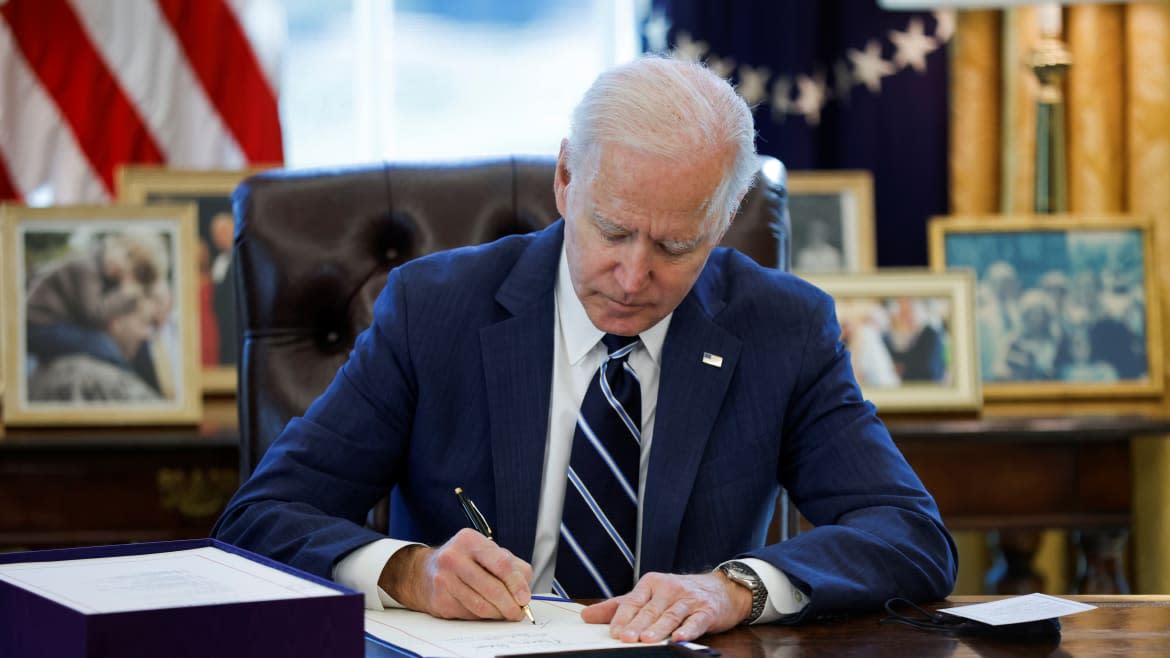Biden Signs Massive $1.9 Trillion COVID-19 Relief Bill Into Law

- Oops!Something went wrong.Please try again later.
- Oops!Something went wrong.Please try again later.
“Help is on the way.”
President Joe Biden’s message on Thursday afternoon was a simple one, but the act of signing the $1.9 trillion American Rescue Plan Act into law officially kickstarted one of the most complex and far-reaching economic relief packages in history—at a moment when any missteps on vaccinations, school re-openings, and direct payments to struggling Americans could have devastating consequences.
The plan is the culmination of nearly two months of effort by the White House to deliver financial aid to struggling states, schools, and individuals, allocating billions for $1,400 direct payments to taxpayers, unemployment assistance, and scaling up production and administration of vaccines against the disease that has claimed nearly 530,000 lives in the United States.
The mammoth legislation, passed without any Republican support in either chamber of Congress, also includes a laundry list of major progressive goals, including a massive expansion of the child tax credit and earned income tax credit, as well as $350 billion in federal aid to assist state, local, and tribal governments with budget shortfalls due to the pandemic and resulting recession.
“It’s clear than an overwhelming percentage of the American people, Democrats and independents and Republican friends, have made it clear—the people out there—have made it clear that they support the American Rescue Plan,” Biden said during the signing ceremony in the Oval Office, adding that the legislation is “about rebuilding the backbone of this country and giving people in this nation—working people, middle-class folks, the people who built this country—a fighting chance.”
The signing comes on the one-year anniversary of the World Health Organization’s declaration that the coronavirus outbreak had become a global pandemic, seen in retrospect as the moment when many Americans realized the gravity of the crisis. Originally scheduled for Friday, the administration bumped up the formal signing of the legislation in order to fast-track delivering relief to Americans as quickly as possible, according to a White House aide.
Later on Thursday, Biden will deliver his first primetime address to the nation since his inauguration. According to the White House, the remarks will lay out the next steps Biden intends to take in addressing the pandemic, and “provide a hopeful vision of what is possible if we all come together.”
Given the universal Republican opposition to the plan in Congress, that’s a pretty big “if.” While the bill is clearly popular among the public—roughly three in four approve of the plan, according to the most recent polling—Republicans have already lambasted the legislation as a “wish list,” in the words of House Minority Leader Kevin McCarthy (R-CA); his Senate counterpart, Sen. Mitch McConnell (R-KY), decried the legislation as a “colossal missed opportunity” to achieve “real” pandemic relief.
To counter that message, the Biden administration has planned an enormous public relations push to spread the word about the package, which White House press secretary Jen Psaki has repeatedly described as “the most progressive bill in American history.” That campaign will include a tour of multiple states by Vice President Kamala Harris and first lady Jill Biden, as well as more frequent travel by Biden himself.
That campaign, essentially a victory lap, hopes to avoid repeating the perceived mistakes of the Obama administration following the passage of the American Recovery and Reinvestment Act of 2009 in response to the Great Recession. Failure to build popular support at the time was seen as a major contributing factor to Democrats losing control of Congress in the 2010 midterms.
Get our top stories in your inbox every day. Sign up now!
Daily Beast Membership: Beast Inside goes deeper on the stories that matter to you. Learn more.

